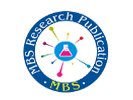Past Issue | Volume | Volume 5,Issue 4,Apr,2019
![]() SEPTOPLASTY WITHOUT NASAL PACKING POST OPERATIVELY
SEPTOPLASTY WITHOUT NASAL PACKING POST OPERATIVELY
Abstract:-
Objective: Objective of this study was to observe any complications which occurred in patients which underwent Septoplasty with postoperatively no nasal packing and also to know degree of pain in patients in which nasal packing was done.
Methodology and Method: This present research was carried out in King Abdul Aziz medical city Jeddah which involved 400 participants for the period between January 2015 and December 2017. The patients under research underwent Septoplasty without nasal packaging post operatively and was checked for any occurrences of complications. Prospective and comparatively study method was used in our research, patients were selected randomly.
For pain patients were assessed on 0 to 10 scale. After Septoplasty quilting suture was applied to septum in all patients.
Result: Out of 400 patients only 2 patients need post-operative packing. The patients were very much satisfied with results post operatively in terms of nasal breathing and experienced no pain. Conclusion: Our research established Septoplasty without nasal packaging post operatively could result no complications and with more patient satisfaction in long term.
![]() MENTAL DISORDER AND SYMPTOMS OF CHILDREN: AN ANALYSIS
MENTAL DISORDER AND SYMPTOMS OF CHILDREN: AN ANALYSIS
Abstract:-
Major depression is an episodic, recurring disorder portrayed by persistent and inescapable pity or unhappiness, loss of pleasure in ordinary activities, crabbiness, and associated symptoms, for example, negative reasoning, absence of vitality, trouble concentrating, and hunger and rest disturbances. Signs can shift as per age, sexual orientation, instructive and social foundation. The different subtypes of depression are recognized based on manifestation seriousness, inescapability, practical weakness, or the nearness or nonappearance of hyper scenes or crazy wonders. There is still much argument about whether depression is a dimensional illness the contrast amongst having and not having depression is quantitative, a matter of degree, for example, on account of hypertension or all out (i.e., distinction is subjective), and whether there are a few etiologically extraordinary sorts of depression (e.g., melancholic and nonmelancholic). Research has distinguished relevant factors that place adolescents at more serious risk of mental health problems. There are additional factors that reinforce versatility among adolescents, buffering them against problems coming from negative conditions. Family bolster, for instance, can help alleviate unfavourable results for children presented to brutality. Measures that record for the impact of social foundation would likewise improve our capacity to evaluate adolescent mental health status. Culture shapes the manner in which individuals view and react to emotional misery.
![]() IMPACTOF CHEMOTHERAPY OF CHILD WITH SOLID TUMOR IN INDIA AND ITS TREATMENT PROCESS: A STUDY
IMPACTOF CHEMOTHERAPY OF CHILD WITH SOLID TUMOR IN INDIA AND ITS TREATMENT PROCESS: A STUDY
Anil Kumar Purvia1, Dr. Muthukannu. M2
Abstract:-
This article manly focused on impact of chemotherapy of Pediatricwith solid tumor in India and its treatment process.Pediatric survival rates have increased in recent years, it has been settled that cancer and its treatment altogether sway children and their families. For the majority of families, a child's cancer diagnosis and treatment is the most troublesome life experience they will confront. While most families change following this huge stressor, no uncertainty adapting to the treatment process is an incredibly troublesome involvement with multiple psychosocial consequences. This paper highlights the passionate and psychological effects of cancer and its treatment on children and their families at each formative stage and highlights basic issues across the cancer treatment continuum.Consolidated knowledge of formative and treatment stage complexities is fundamental to illuminate suppliers regarding how best to care for these children and families. Children experience four unmistakable stages of improvement from birth to adulthood that are regularly conceptualized as newborn child, little child/preschool, school age, and puberty. The effect of cancer treatment depends on the formative stage of the child as make recommendations for alleviating unfriendly squeal. As children exist with regards to families, interventions to moderate the effect of cancer treatment are depicted at each stage of advancement, and recommendations are accommodated the child, the parent, and the family.
Need PHD Research Writing Help?

